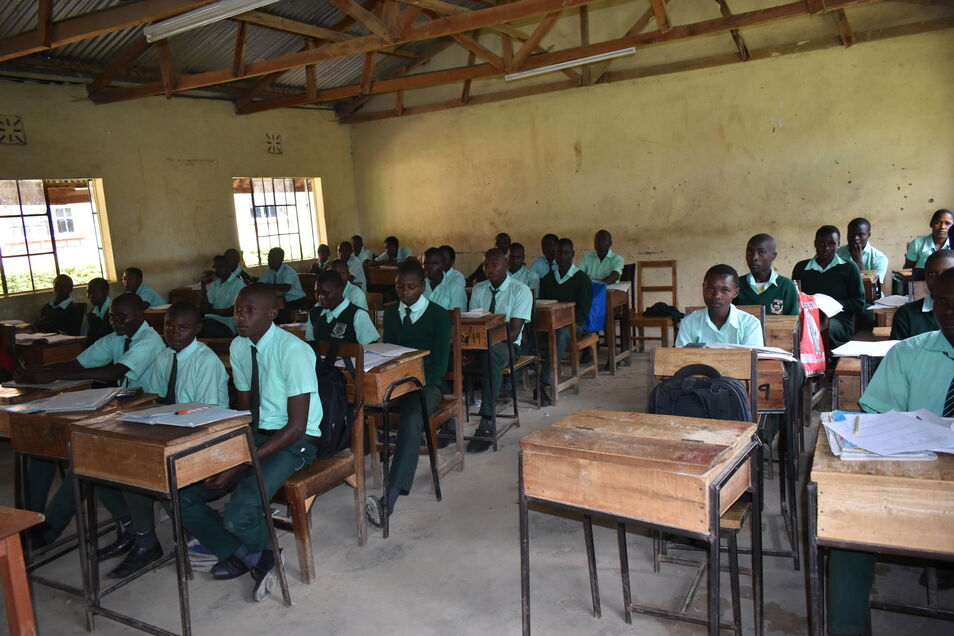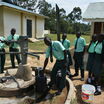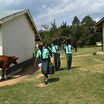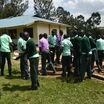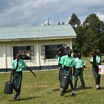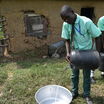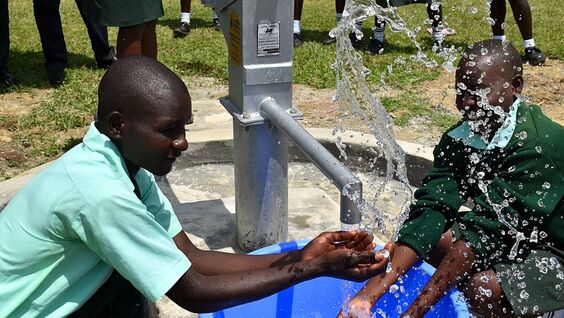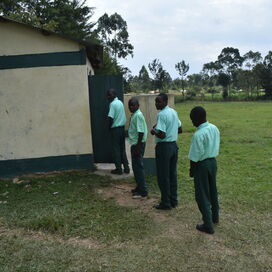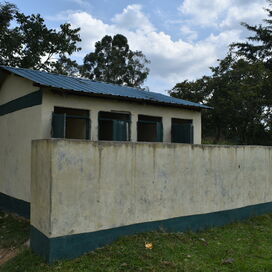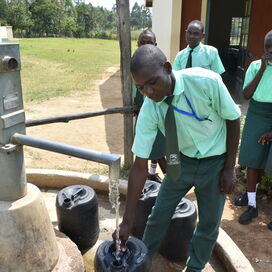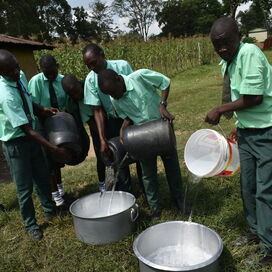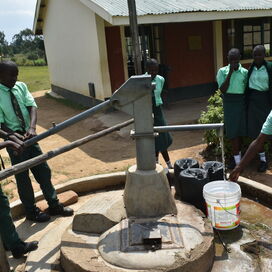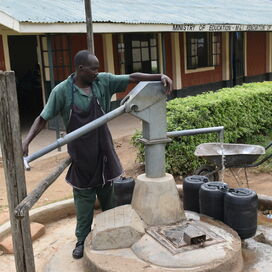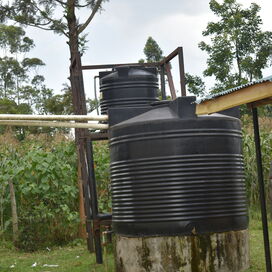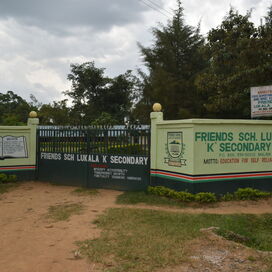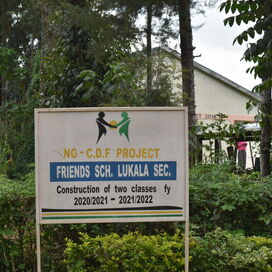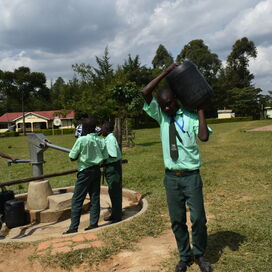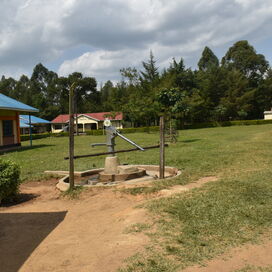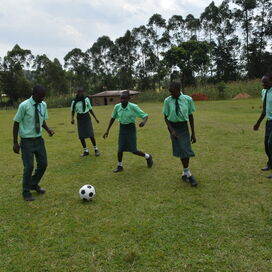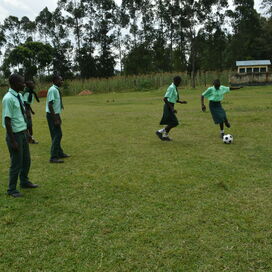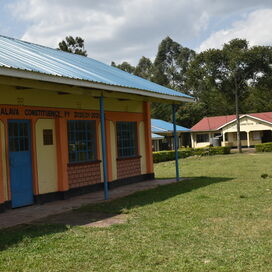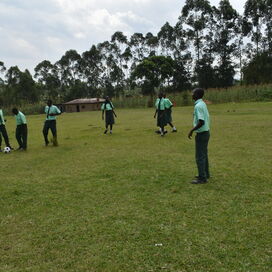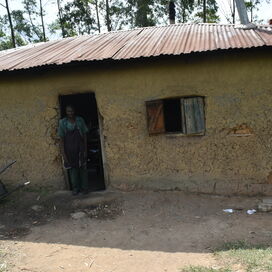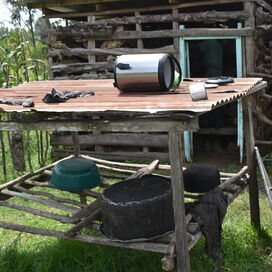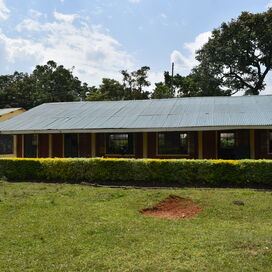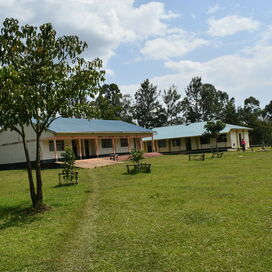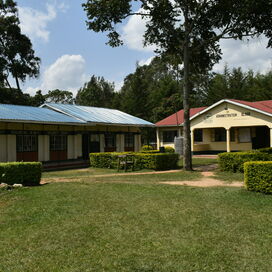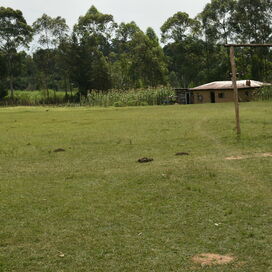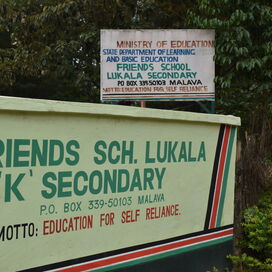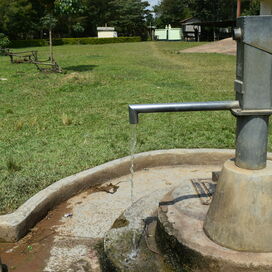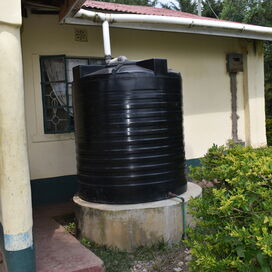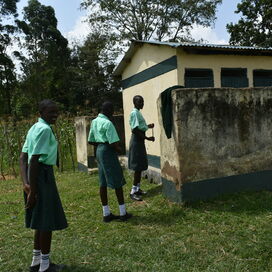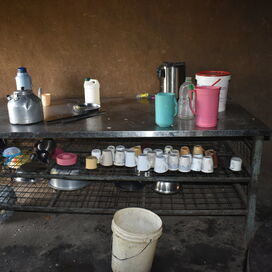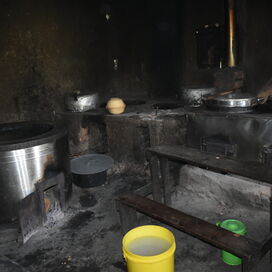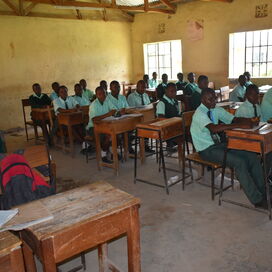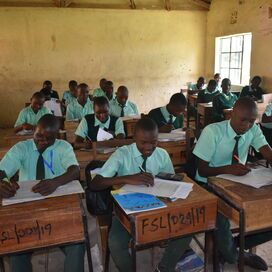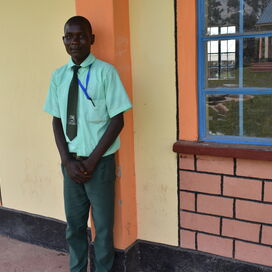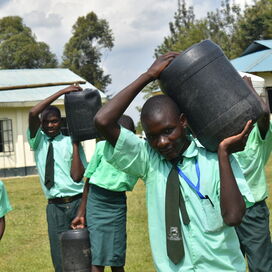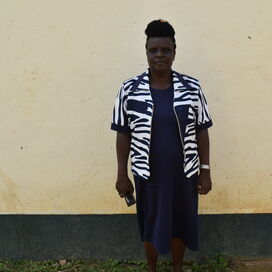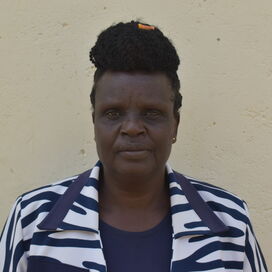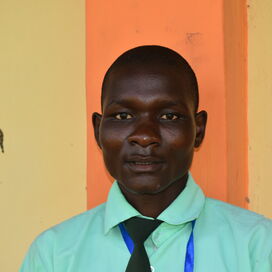Project
Lukala Secondary School
Project Complete!
Lukala Secondary School was established in the year 2005. It began in the primary school section under the leadership of Mr Simon Wasimbi, who was then the primary school's headmaster. It started with 15 students being housed in temporary structures as classrooms. The school office was shared by both the primary and the secondary sections. The school was registered officially by the Ministry of Education in 2008 and had a new principal - Mr. Ronald Makhanu. Contributions from the community members led to the construction of four classrooms. The Ministry of Education then came in with two more classrooms. The school received a grant that enabled them to construct a laboratory. Constituency Development Funds aided in the construction of two more classrooms. The students perform averagely in this school.
The 386 students and staff of Lukala Secondary School scramble daily to collect enough water, but none of the water sources on their school campus can produce sufficient water to meet their needs.
The school has an old dug well, but it runs dry quickly, and the water it produces is questionable. It is not uncommon for students to be disheartened when they are last in line and pull up brown, muddy water. But sadly and understandably, when students are thirsty, they consume any water they can find. In the attached photos, you can see students gathering around the well for a turn to snatch a bit of water before it runs out.
"The last time the hand-dug well went dry, I was forced to drink mud water. I tried pumping, and all that came out was mud water. I had no alternative other than [to] drink it. [I] couldn't hold my thirst until home time," said 18-year-old Fred S.
"The hand-dug well, which is the main water source for this school, dries up during the dry season. The hand-dug well goes dry, rendering pupils helpless in terms of drinking water, handwashing, sanitation, and hygiene. Students go thirsty the whole day, even after having their lunch in school. General cleaning that [is] often done on Fridays has many times been postponed due to lack of enough water within the school," said field officer Lillian Achieng.
The school also has a few small rain tanks, but when rain is sparse, particularly during the dry season, and the demand is great, they run dry quickly. Even when they are full, students can not drink the water because the tank's water is not treated, and its quality is poor.
"The rainwater in the tanks is never used for drinking due to the small visible worms present. The rainwater harvesting tanks go dry, too, during the dry months," said Lillian.
When both sources at the school are empty, students are supposed to be accompanied by staff to collect water from the local river, but this interrupts everyone's day and stops the learning that should be happening.
"Sometimes, I am unable to follow the students out of school when they go to the river to fetch water due to my busy schedule. This has not been taken positively by [my] seniors and has been termed as rebelliousness. It affects my teaching and puts my job at stake," said 55-year-old teacher Jemmimah Nekesa (photo attached).
Not only does it cause delays for everyone, distracting them from their regular routine, but sadly, the water everyone spends so much time and effort collecting is also unsafe to consume. Without alternatives, there is no choice but to take the risk and drink it anyway.
"Water drawn from the river is never safe due to high contamination from animals and plants. Consumption of water from the river has severely caused stomach-related diseases to both students and staff," Lillian concluded.
Installing a borehole well that goes deeper than the dug well will provide sufficient water to meet everyone's needs throughout the year. Then, students and staff will not have to fight for each sip of water and can consume water they can trust whenever needed. They will also regain their time and energy to focus on learning.
The school has an old dug well, but it runs dry quickly, and the water it produces is questionable. It is not uncommon for students to be disheartened when they are last in line and pull up brown, muddy water. But sadly and understandably, when students are thirsty, they consume any water they can find. In the attached photos, you can see students gathering around the well for a turn to snatch a bit of water before it runs out.
"The last time the hand-dug well went dry, I was forced to drink mud water. I tried pumping, and all that came out was mud water. I had no alternative other than [to] drink it. [I] couldn't hold my thirst until home time," said 18-year-old Fred S.
"The hand-dug well, which is the main water source for this school, dries up during the dry season. The hand-dug well goes dry, rendering pupils helpless in terms of drinking water, handwashing, sanitation, and hygiene. Students go thirsty the whole day, even after having their lunch in school. General cleaning that [is] often done on Fridays has many times been postponed due to lack of enough water within the school," said field officer Lillian Achieng.
The school also has a few small rain tanks, but when rain is sparse, particularly during the dry season, and the demand is great, they run dry quickly. Even when they are full, students can not drink the water because the tank's water is not treated, and its quality is poor.
"The rainwater in the tanks is never used for drinking due to the small visible worms present. The rainwater harvesting tanks go dry, too, during the dry months," said Lillian.
When both sources at the school are empty, students are supposed to be accompanied by staff to collect water from the local river, but this interrupts everyone's day and stops the learning that should be happening.
"Sometimes, I am unable to follow the students out of school when they go to the river to fetch water due to my busy schedule. This has not been taken positively by [my] seniors and has been termed as rebelliousness. It affects my teaching and puts my job at stake," said 55-year-old teacher Jemmimah Nekesa (photo attached).
Not only does it cause delays for everyone, distracting them from their regular routine, but sadly, the water everyone spends so much time and effort collecting is also unsafe to consume. Without alternatives, there is no choice but to take the risk and drink it anyway.
"Water drawn from the river is never safe due to high contamination from animals and plants. Consumption of water from the river has severely caused stomach-related diseases to both students and staff," Lillian concluded.
Installing a borehole well that goes deeper than the dug well will provide sufficient water to meet everyone's needs throughout the year. Then, students and staff will not have to fight for each sip of water and can consume water they can trust whenever needed. They will also regain their time and energy to focus on learning.
What We Will Do, Together:
New Well
We conducted a hydrogeological survey at this school and the results indicated the water table beneath it is an ideal candidate for a borehole well. Due to a borehole well's unique ability to tap into a safe, year-round water column, it will be poised to serve all of the water needs for this school's large population, even through the dry months.
New Well
We conducted a hydrogeological survey at this school and the results indicated the water table beneath it is an ideal candidate for a borehole well. Due to a borehole well's unique ability to tap into a safe, year-round water column, it will be poised to serve all of the water needs for this school's large population, even through the dry months.
The school will help collect the needed construction materials such as sand, rocks, and water for mixing cement. They will also provide housing and meals for the work team, in addition to providing local laborers. We will complement their materials by providing an expert team of artisans and drilling professionals, tools, hardware, and the hand-pump. Once finished, water from the well will then be used by the school's students and staff for drinking, handwashing, cooking, cleaning, and much more.
Handwashing Stations
The student health club will oversee the two new handwashing stations we will provide, and make sure they are kept clean and in working condition. The club leaders will fill the handwashing stations with water daily and make sure they are always supplied with a cleaning agent such as soap or ash.
VIP Latrines
We will construct two triple-door latrine blocks using local materials that the school will help gather. Three doors will serve the girls and three doors will serve the boys. All of these new latrines will have cement floors that are designed to be easy to use and to clean. And with a borehole right on school property, there should be enough water to keep them clean.
Training on Health, Hygiene, COVID-19, and More
We will hold a one-day intensive training session with students, teachers, and parents. This training will cover a wide range of topics including COVID-19 symptoms, transmission routes, and prevention; personal and environmental hygiene; and the operation and maintenance of the borehole, latrines, and handwashing stations. There will be a special emphasis on handwashing.
Handwashing Stations
The student health club will oversee the two new handwashing stations we will provide, and make sure they are kept clean and in working condition. The club leaders will fill the handwashing stations with water daily and make sure they are always supplied with a cleaning agent such as soap or ash.
VIP Latrines
We will construct two triple-door latrine blocks using local materials that the school will help gather. Three doors will serve the girls and three doors will serve the boys. All of these new latrines will have cement floors that are designed to be easy to use and to clean. And with a borehole right on school property, there should be enough water to keep them clean.
Training on Health, Hygiene, COVID-19, and More
We will hold a one-day intensive training session with students, teachers, and parents. This training will cover a wide range of topics including COVID-19 symptoms, transmission routes, and prevention; personal and environmental hygiene; and the operation and maintenance of the borehole, latrines, and handwashing stations. There will be a special emphasis on handwashing.
Our team of facilitators will use a variety of methods to train, including participatory hygiene and sanitation transformation, and asset-based community development. We will initiate a student health club, which will prepare students to lead other pupils into healthy habits at school and at home. We will also lead lectures, group discussions, and provide illustrative handouts to teach health topics and ways to promote good hygiene practices within the school including handwashing and water treatment. We will then conduct a series of follow-up trainings before transitioning to our regularly scheduled support visits throughout the year.
We and the school strongly believe that all of these components will work together to improve standards at this school, which will help lead to better student academic performance and will help unlock the opportunity for these students to live better, healthier lives.
0.464118 latitude, 34.824671 longitude
H2O for Life is not a WASH (water, sanitation and hygiene) project implementer. We have partnerships with non-governmental organizations (NGOs) implementing WASH in Schools projects around the world. Our NGO partners match funds needed for each school project. We also have a generous donor that provides us with an interest-free loan that, along with matching funds, allows for many projects to be started or possibly even completed before total funds have been raised. In rare situations we reserve the right to reallocate funds to alternate project(s).
Questions? Ask us at 651-756-7577 or info@h2oforlifeschools.org.
February 3, 2025
Lukala Well Complete!
Your contribution has given access to clean water for the Lukala Secondary School in Kenya, thanks to the completion of their borehole well! Clean, flowing water is already making a...
